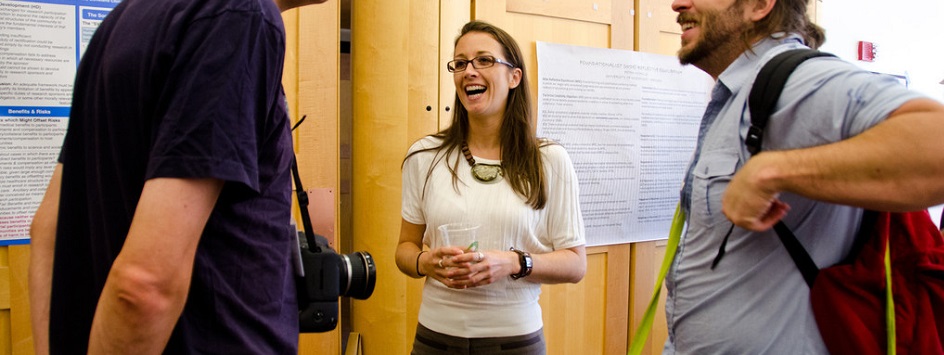Current Research
Broadly speaking, my research seeks to bring frameworks and insights from political philosophy to bear on questions in applied ethics, and in particular on questions in the ethics of scientific and technological progress. The dialectic underlying many discussions about exploitation within both bioethics and business ethics takes the same form as that addressed in two early papers I wrote about exploitation in clinical research (“Against Permitted Exploitation in Developing World Research Agreements” and “Diversion Effects, Incentive Effects, and the Goals of Research Ethics Promulgations”): Many recognize that not all exploitative interactions are non-consensual, and consider the most philosophically interesting, and most difficult to assess, cases of exploitation to be precisely those instances that are both fully consensual and mutually beneficial. Aside from questioning what might be wrong about such interactions, the question also remains what to do about them from the perspectives of ethics and policy-making. A common refrain is that even if there is something morally wrong with such mutually-beneficial exploitation, it would nevertheless also be wrong to interfere with it – by promulgating ethical norms, for example, or regulating it to try and increase benefits to exploited parties. This is because such intervention both runs the risk of depriving those who are exploited of a net benefit that is desperately needed, and also disrespects the autonomy of those who are exploited by interfering with their ability to make fully-informed decisions to enter into certain kinds of transactions. This problem about exploitation – how to understand what is wrong about it, and what to do about it from an ethical and policy perspective – is the jumping off point for several, interconnected lines of research that I’ve developed over the years: one on the social value of research and the ethics of health research priority-setting; one attempting to shift focus in applied ethics from the interactional level to structural features that inform interactions; and one exploring the connections between exploitation, autonomy, and the neorepublican conception of freedom as non-domination, and the application of the latter to problems in applied ethics.
Social Value and Priority-Setting
One of those lines runs through the notion of a “social value requirement” (SVR) – the idea that in order to be ethical, clinical research must be capable of generating socially valuable knowledge – as one potential response to exploitation in international clinical research. In an early paper (“The Social Value of Knowledge and International Clinical Research”), I argued that the justification for subjecting human participants to risks of harm in clinical research is the potential for generation of socially valuable knowledge, and that the social value of research-generated knowledge is importantly context-dependent in a way that ought to inform which research should be conducted in which populations. This work was further developed in a second paper (“The Social Value of Knowledge and the Responsiveness Requirement for International Research”). This paper uses decision theory to formalize the social value requirement, and goes on to argue that a contextualized version of the SVR is the best candidate to fill in what is known as “the responsiveness requirement” – the idea that in order to be ethical, research conducted in low- and middle-income communities must be responsive to local health needs. This work has been particularly influential within international research ethics, informing at least one major international ethics guidance document for research.
ethicists have sought to put pressure on the idea that research sponsored by private entities (as opposed to publicly-funded research institutes) should be bound by anything resembling a social value requirement. In a 2018 paper (“The Social Value Requirement in Research: From the Transactional to the Basic Structure Model of Stakeholder Obligations”), I argue that much of this debate is conducted against the background of an often unacknowledged commitment to what I call the “transactional model of stakeholder obligations.” This model implicitly understands clinical research as comprised of voluntary interactions between consenting parties, typically including (although maybe not limited to) research sponsors, investigators, and research participants. I argue that a more adequate model of research stakeholder obligations is what I call the “basic structure model.” This model takes clinical research to be one component of an institutional structure governing the health systems that are available to individuals – an institutional structure from which they cannot opt out, and which has deep and lasting impacts on their life prospects. Drawing on John Rawls’s arguments regarding the central importance of what he called the “basic structure of society,” I contend that this model of research places it squarely within the purview of basic justice considerations. As such, stakeholders in the research enterprise have obligations not only to those with whom they directly interact as sponsors, investigators, and participants, but also to all of those who participate in the healthcare systems which research aims to fundamentally impact.
The basic structure model served as the jumping off point for a Greenwall Foundation Fellowship, which sought to unpack the practical implications of viewing research as a basic structure institution, in particular for the ethics of health research priority-setting. The shift in grounds for the social value requirement away from a transactional and towards a basic structure model impacts both the content and scope of the social value requirement, and importantly is inconsistent with some recent attempts in the literature to enunciate the ethics of health research priority-setting. In a recently-published paper (“The Social Value of Research and Health Research Priority-Setting”), I show how different views about the nature of health research generate different obligations related to health research priority-setting, and that the basic structure orientation grounds robust justice-oriented obligations across funder types. In a related paper, currently under revision, I argue that contemporary debates about health research priority-setting problematically take the background institutional structure of research and the distribution of priority-setting power that it entails for granted. I argue that this complacency about how existing structures constrain health research functions to both artificially constrain the available alternatives for ethically setting priorities, as well as to obscure obligations of justice in a way that reifies existing distributions of power that are in deep tension with realizing health justice.
From the Interactional to the Structural
A second through-line from my interest in problems of exploitation – which is also evident in some of the papers mentioned above, particularly my work on the basic structure model – concerns what I think is a problematic tendency in applied ethics to focus on the ethics of individual interactions, often in ways that obscure the relevance of background relationships of power and structures of injustice. In a 2018 paper (“Exploitation and International Clinical Research: The Disconnect Between Goals and Policies”), I note that many of the recommendations made in international research ethics for avoiding or mitigating exploitation are grounded in a transactional account of exploitation – that is, one which understands exploitation as something wrong about an interaction between two parties with differing abilities to walk away from the interaction if they don’t get the terms they desire. But this grounding is not particularly helpful for many of the recommendations that are made – particularly those which focus on ensuring that local host communities benefit from the research in various ways. This is because host communities can’t easily be construed as parties to research interactions in the necessary way. This suggests a kind of mismatch between the theoretical model(s) of exploitation that underlie these recommendations and the recommendations that are made. In a related co-authored paper, currently under revision, we make the case that international clinical research can be more helpfully understood as structurally exploitative – such that the primary wrong in these cases should not be understood as a wrong committed by one identifiable party against another in a specific interaction, but rather as about the way(s) in which social structures constrain the options sets available to differently situated social groups, such that they result in the systematic transfer of productive powers from groups positioned as socially inferior to groups positioned as socially superior. This theoretical framework is both more explanatorily powerful in highlighting the problematic aspects of international research, as well as better able to ground the types of benefits to host communities that many international research ethicists seek to defend.
In another manuscript, I and a different co-author use debates about exploitation as an exemplar to show how some ways of doing non-ideal theory can function to maintain and even reify structural injustice. We illustrate how the framing of debates about exploitation as described above makes a conceptual error in conflating the types of wrongs that occur in one-off exploitative interactions and those that occur within ongoing structural relationships within the global economy. We go on to argue that this conflation leads many contemporary theorists of exploitation to theorize in a manner that is both overly isolated from attempts to address larger structures of injustice as well as inconsistent with such attempts – in the process, reifying and reinforcing the very structural injustices that non-ideal theorists take for granted. We use this illustration to introduce a new complication to existing taxonomies of ideal vs. non-ideal theory, which we call “static non-ideal theory.”
One of the major upshots of this paper, however, is the meta-philosophical point that we can’t do responsible applied theorizing – whether applied political philosophy or applied ethics – without developing a deeper understanding of various interplays of power. And by this I mean, first, that applied philosophy must engage with the ways that power informs the background conditions within which various agents interact with one another. But also, and more importantly, power has and continues to have a direct impact on how theorists understand the problem spaces within which we work, and responsible theorizing must be attuned to the ways in which the theoretical frameworks we deploy have themselves been deeply informed by relations of power. I view this paper as thereby identifying an important lacuna within applied ethics: an account of power that can be usefully deployed within applied ethics broadly, and within bioethics (and research ethics) more specifically. Looking forward, the development of such an account is one major project that I see coming down the pipeline, and I began efforts in that direction this spring, when I taught a graduate seminar on the political theory of power.
Autonomy and Non-Domination
Finally, in a third through-line motivated by an interest in expanding the conceptual toolbox that ethicists use to analyze interactions often discussed under the rubric of “exploitation,” I explore the conceptual connections between exploitation, autonomy, and the republican notion of freedom as non-domination. In a 2019 commentary (“Licensing Domination: Foreign Will and Social Benefit”), I again take note of a problematic focus on individual interactions to the exclusion of important background structural features of interactional contexts. In attempting to navigate the tension between exploitation worries in international clinical research (often exacerbated by offering too few benefits to research participants) and worries about so-called “undue influence” (brought on by offering so many benefits that autonomous consent is seen to be compromised by an offer’s irresistibility), some theorists take for granted the notion of freedom in the standard liberal, “negative” sense of non-interference. I argue that understanding freedom this way leaves us ill-equipped to understand how background structures of injustice can limit effective freedom, while deploying the republican conception of freedom as non-domination gives us additional theoretical resources to account for the background conditions in which interactions take place. In a related paper (“Non-Domination and the Limits of Relational Autonomy”), I argue that the conceptual framework of freedom as non-domination is both conceptually neater than either liberal or relational conceptions of autonomy, while also better suited to serving the goals of feminist theorists who seek to identify, problematize, and combat oppression.



